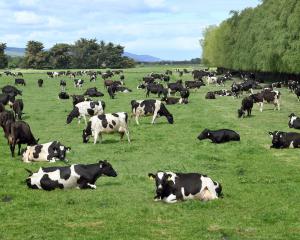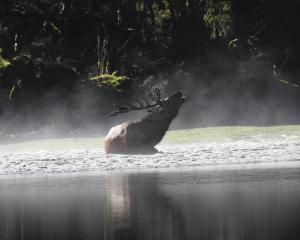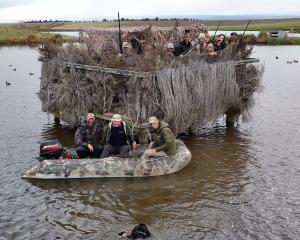
Mr Jackson (25) was a herd manager on a 600-cow dairy farm at Taramoa in Southland when he won the Otago-Southland regional final held at Middlemarch in March.
But last month, he arrived back in the small farming settlement of Te Akau, north of Raglan, to work on his family’s sheep and beef farm.
Southland would always hold a spot in his heart and there was a southern contingent who would be supporting him at the grand final, he said.
Mr Jackson’s rural upbringing inspired him to pursue the agriculture industry as a career once he finished boarding school.
In 2017, he moved to Palmerston North to study agri-commerce at Massey University and he also joined the Massey Young Farmers Club.
During most of his school and university holidays, he could be found working on the family farm. He enjoyed helping out, working with stock and anything practical-related from a young age, he said.
It was a typical rural childhood, as he recalled spending time at a mate’s home down the road, hunting possums.
After graduating from university, he was keen to initially gain some different experience before going farming and he joined DairyNZ in a rural professional role.
In 2020, he was selected for DairyNZ’s graduate programme, running events and facilitating discussions between farmers for two years, out of Invercargill and then Ashburton.
At that stage, his only involvement in the dairy industry had been doing some relief milking while he was at university and a summer on a dairy farm as part of his practical requirements.

He was not bothered where he was based and he was dispatched first to Invercargill, where he did not know anyone — he knew one person in Southland whom he went through university with and she was working at Mount Linton Station, which was an hour and a-half away.
While some questioned why he would want to move from one end of the country to the other, Mr Jackson said he was genuinely excited about the opportunity, which he described as "a bit of an adventure".
He quickly became involved with the community, signing up with Thornbury Young Farmers, the local fire brigade and the squash club.
He built up a network and loved his time in the south, where he also got involved in deer hunting as Southland was ideally positioned for recreational activities.
Reluctant to leave Southland, Mr Jackson ended up moving to Ashburton for a year with DairyNZ as an extension partner and was chairman of Hinds Young Farmers Club.
From there, he admitted he "hit the wall’ a bit, not being able to see much of a future in the job in terms of progression and he was also missing Southland.
He returned south for the herd manager position, having met sharemilkers Sam Hodsell and Jenna Hansen through Thornbury Young Farmers, and was there for 15 months.
Back home in Te Akau, Mr Jackson said the contour of the property was not favourable to run dairy cows on, although he was keen to try some new things.
He had always been keen to return to the home farm to give it "a crack" and it was a case of now or never. Large tracts of the 1800ha (1600ha effective) property were steep.
This year’s regional final was his fourth attempt at securing a spot in the grand final, where he will compete against the six other regional winners; Lisa Kendall (Northern), Emma Poole (Waikato-Bay of Plenty), Patrick Crawshaw (East Coast), Mac Williams (Taranaki-Manawatu) and brothers Nick and Peter O’Connor(Tasman and Aorangi respectively).
Mr Jackson had always enjoyed competing, pushing himself and learning, all reasons which drew him to have a crack at the competition.
He was keen to encourage more young farmers to enter, saying everyone had their own strengths and weaknesses and there was always something to be learned.
There was also that rush of adrenaline when competing the practical tasks and the head-to-head competition.
Since being home, Mr Jackson had been doing contest preparation in the morning, after which his brain was ready for a break and he would head out on the farm in the afternoon.
Asked his own strengths and weaknesses in the contest, he said he had a "fairly good base" across most of the competition and he could take some confidence in that.
He had always enjoyed the practical work on the farm, he had some theory covered from his time at university and he had also spent several years at Toastmasters. That was coupled with his time spent in both the sheep and beef and dairy industries.
There had been a get-together with the other finalists, and Peter O’Connor was also a member of Hinds Young Farmers Club while Mr Jackson was there. They were a really good bunch of people and he was looking forward to keeping in touch with them once the contest was over.
His own support crew were looking forward to a good few days in South Canterbury and he was keen to see them.
Once the competition was over, he was looking forward to getting "stuck in, training up some dogs and chasing some bulls and sheep" as well as getting back into his fire-fighting.
Passionate about the rural sector, one thing he would like to see improve in the industry was how farmers talked about mental health and wellbeing. Having had his own first-hand experiences with it, he knew what it was like to ask for help.
Depression was the biggest challenge he had experienced and overcome. He first experienced depression when he moved to Southland, and later when he was in Canterbury, and described it as self-inflicted.
It came from his desire to achieve and he set too high expectations of himself. Thinking he was not achieving or setting potentially unrealistic expectations and trying to work hard to improve himself meant he got himself "down a bit of a downward spiral".
Talking about it was key and he had a lot of respect for Ollie Knowles, his DairyNZ manager in Southland, who suggested he see a counsellor. While initially reluctant, he said talking about it — and also learning about mental health — had definitely helped.
He also read Marlborough farmer Doug Avery’s book The Resilient Farmer, while a workmate gave him a book by Sir John Kirwan which he also found very beneficial.
People tended to say they were "all good" when asked how they were and he encouraged people to press them, if they thought there might be something wrong, to get them to talk.
Once he started talking about his own experiences, he was amazed by the amount of people who said they had experienced the same thing.
Sitting down and talking to employers about goals and career progression was also important, he said.















